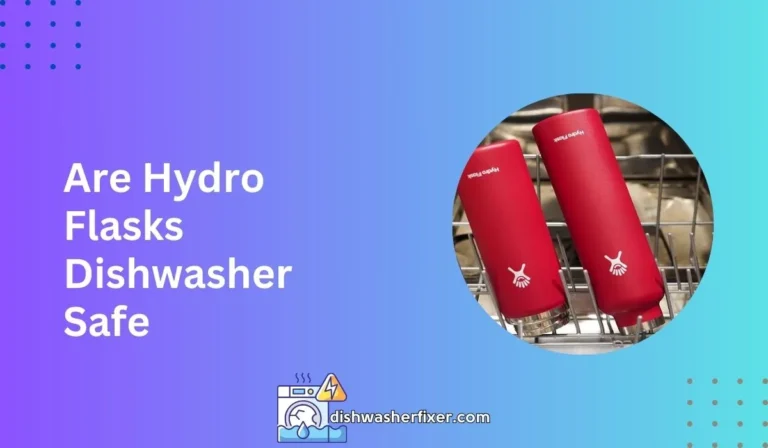Why is My Dishwasher Leaving Residue? Beat the Grit!
Your dishwasher may leave residue due to hard water, clogged spray arms, or the use of incorrect detergent. Ensure that you use the right detergent and periodically clean the filter and spray arms.
Common Causes of Dishwasher Residue

Hard Water Mineral Buildup
One of the top reasons for dishwasher residue is hard water. Hard water contains high levels of minerals like calcium and magnesium.
Over time, these minerals can accumulate on dishes, creating a white, cloudy film. This can happen even if you’re using the correct amount of detergent and operating the dishwasher properly.
Inappropriate Detergent Use
Using the wrong type of detergent, or too much or too little of it, can lead to residue.
Detergents that are not designed for dishwasher use or low-quality options may not dissolve properly, causing a gritty or soapy layer on your dishes after a wash cycle.
Overloading the Dishwasher
Adding too many dishes or not placing them correctly can block water jets and prevent your dishwasher from cleaning effectively. Overloading can result in dishes not being thoroughly rinsed, leaving food particles and soap behind.
Rinsing Agent Issues
If you’ve noticed spots or film on your glassware, it could be due to a lack of rinse aid. Rinse aids are designed to help water slide off dish surfaces more easily, preventing droplet formation and the subsequent residue that can occur when those droplets dry.
Dishwasher Filter and Drain Blockages
Residue can also be the result of a clogged filter or drain. Food particles and other debris need to be regularly cleared from the filter and drain area to prevent them from being redeposited onto clean dishes.
Old or Expired Dishwasher Detergent
Detergent can lose its effectiveness over time. If you’re using an old or expired product, it may not dissolve well, which can leave a residue on your dishes. Always check the expiration date and store detergents in a cool, dry place.
Inadequate Water Temperature
Your dishwasher needs hot water to clean effectively. If the water temperature is too low, the detergent may not dissolve properly, and grease or food particles may not be fully removed, leading to residue.
Troubleshooting and Maintenance Tips to Prevent Residue

Checking and Cleaning the Filters Regularly
To avoid blockages that can cause residue, check and clean your dishwasher’s filters regularly. A clean filter ensures that water can circulate freely and that debris is captured and removed.
Ensuring Correct Detergent Dosage and Type
Always use a detergent that’s specifically made for dishwashers and follow the manufacturer’s recommended amount. This helps prevent both under and overuse, which can lead to residue.
Utilizing a Water Softener or Rinse Aid
For those with hard water, a water softener can be a game-changer. Additionally, using a rinse aid can prevent spotting and film, leaving your dishes sparkling clean.
Loading the Dishwasher Properly to Allow Water Circulation
Proper loading is crucial for clean dishes. Make sure there’s enough space between items for water to circulate. Avoid nesting bowls or overlapping plates to ensure each item gets cleaned.
Running Hot Water in the Sink Before Starting a Cycle
This simple step can make a big difference. Running hot water in the sink warms up the pipes, ensuring that the dishwasher receives hot water right from the start of the cycle.
Cleaning the Spray Arms for Unobstructed Water Flow
The spray arms should be checked and cleaned periodically to ensure that water can flow through all the nozzles. Obstructions can prevent dishes from being rinsed properly, leading to residue.
Periodically Cleaning the Dishwasher with a Vinegar Solution
A vinegar solution can help to dissolve mineral buildup and deodorize your dishwasher. Run an empty cycle with a cup of white vinegar placed on the top rack to clean out any lingering residues.
Professional Intervention and When to Seek Help

Persistent Residue After Troubleshooting
If you’ve tried all the troubleshooting steps and still see residue, it might be time to seek professional help. A technician can diagnose and solve more complex issues that are not easily handled at home.
Identifying Problems With Water Jets or Heating Elements
Issues with water jets or heating elements are often not visible to the naked eye. A professional can check these components to ensure they are working correctly, which is essential for the dishwasher to function properly.
Signs of Malfunctioning Dishwasher Components
If your dishwasher is making unusual noises, not completing cycles, or showing error codes, these could be signs of malfunctioning components that need professional attention.
Understanding When to Call a Professional
It’s important to know when to call a professional. If you’re not comfortable performing maintenance or if the problem persists after you’ve tried to fix it, professional help can prevent further damage to your appliance.
Maintenance Service Schedules for Longevity of the Appliance
Regular maintenance services can extend the life of your dishwasher. Professionals can provide a thorough cleaning and inspection to ensure that all components are in top condition.
FAQs About Dishwasher Residue
Why does my dishwasher leave white residue on dishes?
White residue on dishes is often caused by hard water minerals in your water supply. Using rinse aid or water softeners can help prevent this.
Can clogged spray arms cause my dishwasher to leave residue?
Yes, clogged spray arms can prevent water from reaching all surfaces, resulting in dishes with residue. Cleaning the spray arms periodically can improve performance.
How does using the wrong detergent affect my dishwasher’s performance?
Using incorrect detergent can lead to poor dishwashing results, including residue. Be sure to use a detergent that is recommended for your specific dishwasher model.
What is the importance of cleaning the dishwasher filter for preventing residue?
Cleaning the dishwasher filter is crucial for maintaining good water flow and preventing food particles from re-depositing on dishes, thus avoiding residue.
Is hard water the only reason my dishwasher leaves spots on glassware?
No, hard water is a common cause, but spots can also result from excessive detergent, a malfunctioning heating element, or not using a rinse aid.
Final Thoughts
To address residue left by your dishwasher, examine water hardness, maintain clean spray arms, and use appropriate detergent.
Regularly cleaning the filter and spray arms can prevent buildup, while selecting the correct detergent ensures proper cleaning without leaving residues behind.





